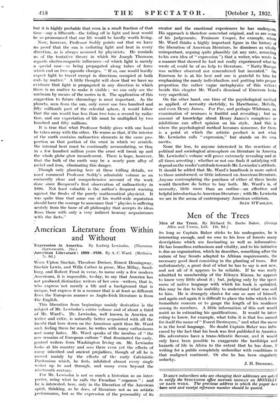American Literature from Within and Without
Expression in America. By Ludwig Lewisohn. (Thornton NIrril Upton Sinclair, Theodore Dreiser, Ernest Hemingway, 'Sinclair Lewis, and Willa Cather in prose, Miss Millay, Sand- Mug. and Robert Frost in verse, to name only a few modern Americans, it is impossible, to-day, to say that America has . not produced, distinctive writers of her own—writers, that is, 'who express -not merely a life and a background that is -unique, but express it in a manner that is at least as different
froth the European manner • as Anglo-Irish literature is from .the English.
This liberation from beginnings mainly derivative is the subject of Mr. Lewisohn's entire volume and of about a third of Mr. Ward's. Mr. Lewisohn, well known -in America as iviiter and critic, is naturally better acquainted With all the .1 incubi that bore down on the American spirit than Mr. Ward
and, feeling them far more, he writes with many enthusiasms :and many hates. Mr. Ward speaks of the incubus of " the sere remains of European culture " that dominated the early, genteel writers from Washington Irving on. Mr. Lewisohn looks at his country and sees there even yet the effects of ninny inherited and ancient prejudices, though of all he is moved mainly by the effects of the early Calvinistic Puritanism which, he feels, inhibited almost every single
writer up to and through, and many even beyond the nineteenth century.
creator and the emotional experiences he has undergone. His approach is therefore somewhat original, and so are some of his judgements. Fenimore Cooper, for example, whom Mr. Ward thinks a highly important figure in the history of the liberation of American literature, he dismisses as wholly unimportant, arguing quite plausibly (at any rate, according to his own idea of " expression ") that a writer, who wrote in a manner that showed he had not really experienced what he wrote of, could be of no help to literature. " Natty Bumps was neither observed nor remembered but invented." 04 Emerson he is at his best and one is grateful to him for emphasizing the manly individualism and putting into proper proportion the rather vague metaphysics of: this writer: beside this chapter Mr. Ward's dismissal of Emerson looks Very superficial.
On the other hand, one-tires of the psychological method as applied, of necessity sketchily, to Hawthorne, Melville, and even Henry James. For Poe, and perhaps Whitman, an examination of neuroses is fruitful and revealing ; but no amount of knowledge about Henry James's complexes or inhibitions can affect opinion on his style. And this is where the psychological method becomes nonsense, for there is a point at which the artistic product is not what Mr.- LeiviSohn calls " expression," but stands on its own merits.
None the less, to anyone interested in the reactions of political and sociological atmosphere on literature in America Mr. Lewisohn's volume will prove extremely revealing and at all times arresting ; whether or not one finds it satisfying will depend on the reader's attitude towards Mr. Lewisohn's attitude. It should be added that Mr. Ward's handbook is more suited to those uninformed, or little informed on American literature. Anyone contemplating the purchase of either of these books would therefore do better to buy both. Mr. Ward's is, of necessity, little more than an outline—an effective and helpful introduction to American literature ; with Mr. Lewisohn we are in the arena of contemporary American criticism.
SEAN O'FAOLLIN.














































 Previous page
Previous page